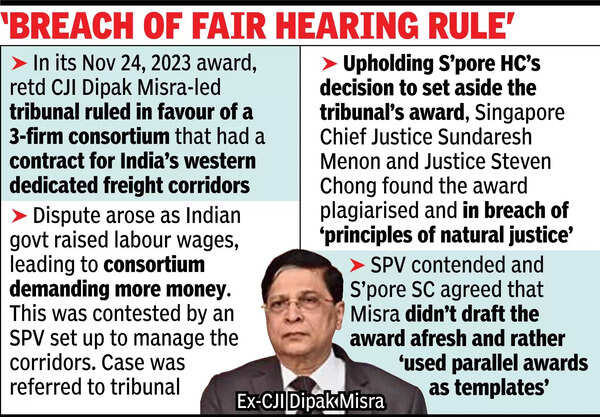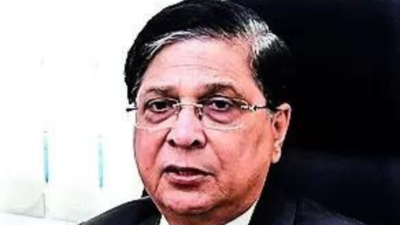NEW DELHI: In a major embarrassment, Singapore Supreme Court has quashed an arbitral award against the special purpose vehicle (SPV) set up to manage dedicated freight corridors in India after finding that the tribunal headed by retired CJI Dipak Misra had copied 212 of 451 paragraphs from two earlier awards involving the same parties but on different issues.
Though the tribunal also comprised MP HC ex-Chief Justice K K Lahoti and ex-CJ of J&K HC Gita Mittal, a Singapore SC bench led by Chief Justice Sundaresh Menon said since the other two were not part of the earlier awards, it couldn’t be ascertained whether they were even aware of Misra’s “copy-paste” job.
The Singapore SC was firm that the copying compromised the integrity of the arbitration process and thus it did not adhere to the “principles of natural justice”.
The court said, “The patently substantial material derived from parallel arbitrations were extraneous considerations that hadn’t been raised to the parties’ attention. The material formed such a pervasive part of the award that it simply could not be overlooked. It was plain that it was neither contemplated nor agreed to by the parties that the award could be prepared by such a process. We agree with the (Singapore HC) judge there had been a breach of the fair hearing rule.”

By its award dated Nov 24, 2023, the Justice Misra-led tribunal had ruled in favour of the three firms which formed a consortium to bag the contract for Western Dedicated Freight Corridor in Aug 2015. A dispute arose because of the Indian govt’s decision to raise labour wages, leading to the consortium demanding more money which was contested by the SPV, and the matter was referred to the Justice Misra-led arbitration tribunal.
Upholding the Singapore HC’s decision to set aside the award, Justices Menon and Steven Chong in a 40-page judgment analysed the award, found it plagued by copying and in breach of the principles of natural justice. The Justice Menon-led bench accepted the SPV’s arguments and rejected those of the consortium.
The SPV contended that Justice Misra, during the arbitration, had used extensive material derived from parallel arbitrations. “It is also common ground that the award was not drafted afresh. Rather, the parallel awards were used as templates, with adjustments made to account for what were thought to be the specificities of the arbitration,” the Singapore SC said.
CJ Menon said the SPV had abandoned some of the submissions made in the parallel arbitrations and replaced these with new arguments unique to the arbitration at hand. “These new arguments arose because of the slightly different factual matrix presented by the arbitration: for instance, the difference in the length of delay between the issuance of the notification and the consortium’s claim allowed the SPV to make additional arguments on estoppel,” he said.
“Despite this, the parallel awards were used as templates in drafting the award to a very substantial degree. It is undisputed that at least 212 paragraphs from the parallel awards were retained in the 451-paragraph award. This has several implications,” the Singapore SC said.
“We also consider that the expectation of equality between the arbitrators was compromised. While, as we have noted, there is no evidence as to what transpired between the members of the tribunal, it is known that the two co-arbitrators in this case were not privy to the parallel arbitrations. They would thus have had no direct access to any material or knowledge derived from those proceedings, but which appeared to have significantly influenced the outcome of the present arbitration. The integrity of the arbitration was, therefore, further compromised as a result,” it said.


